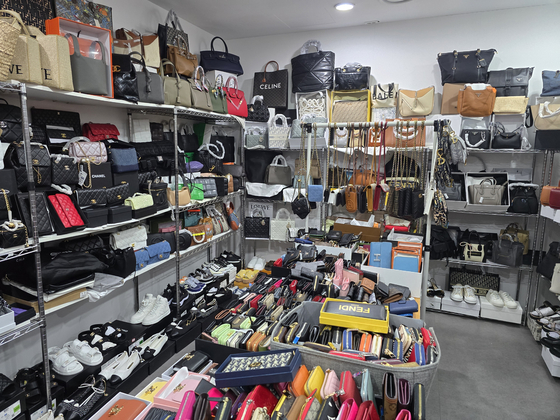Our Terms & Conditions | Our Privacy Policy
Authorities bust secret store selling fake Cartier, Chanel goods in Myeong-dong
Counterfeit items on display at a secret store in Myeong-dong, Jung District, central Seoul, in November last year. [SEOUL METROPOLITAN GOVERNMENT]
Seoul authorities filed criminal charges against sellers of counterfeit Chanel, Louis Vuitton, Moncler and other luxury items in Myeong-dong, Jung District, central Seoul, after confiscating more than 1,200 fake products.
The counterfeit pieces, including handbags, watches and wallets, were all seized from a single secretive store in the heart of the capital after a three-month investigation by the Seoul Metropolitan Government’s Civil Affairs and Judicial Police Bureau. The bureau tracked and investigated the counterfeit-selling shop from November last year to February this year.
Due to the variety of products, Seoul city officials used mannequins to display some of the counterfeit goods to the press on Thursday at a Seoul government building on Mount Namsan in Jung District.
Among them were 461 wallets that claimed to be from luxury brands like Goyard, Chanel and Louis Vuitton, 434 bags and 31 pieces of clothing claiming to be from Moncler and Canada Goose.
Additionally, there were 125 watches, including fake Cartier pieces, and 47 pairs of earrings, including counterfeit Van Cleef & Arpels pairs. If all the confiscated items had been genuine, their total market value would have been 3.82 billion won ($2.66 million), according to the Seoul Metropolitan Government.
A knockoff Chanel bag placed on the floor had uniform leather texture, vibrant colors and precise stitching without fraying. Turning over the slightly weighty buckle revealed a gold brand logo inside the leather. In terms of logo size and placement, it resembled an authentic Chanel classic handbag with gold-tone metal chains, which typically costs over 10 million won.
This was a high-grade “S tier” counterfeit.
![Counterfeit items in display at a secret backdoor store in Myeong-dong, Jung District, central Seoul, in November last year. [SEOUL METROPOLITAN GOVERNMENT]](https://pune.media/wp-content/uploads/2025/02/3af9fa91-ec5d-43fd-b746-8ca7030edeea.jpg)
Counterfeit items in display at a secret backdoor store in Myeong-dong, Jung District, central Seoul, in November last year. [SEOUL METROPOLITAN GOVERNMENT]
The sellers operated a secret store in Myeong-dong. Outwardly, the store appeared ordinary, but a hidden wall panel could be pressed to reveal a secret passage that revealed a staircase toward a concealed 100-square-meter (1,076-square-foot) store.
“The secret space was set up like a shopping center, displaying counterfeit goods,” said Park Jin-hee, an investigator from Seoul’s Trademark Investigation Team. “Inside, there were explanations and consultations about the fakes, as well as leather sofas for customers to try them on comfortably.”
To evade crackdowns, the suspects displayed authentic luxury goods in the visible part of the store. They also targeted foreign tourists visiting Korea by advertising counterfeits in foreign languages, such as Japanese, on social media platforms like Instagram. Only foreign customers who found the store through social media were guided through the secret passage to the hidden store where sales took place.
The suspect behind the counterfeit operation had already been investigated five times in Myeong-dong for violating trademarks. Before being caught in the secret warehouse, they changed locations three times to avoid detection and used other people’s names for bank accounts and business registrations.
“The reason he kept selling counterfeit goods despite prior convictions is that the fines are negligible compared to the profits,” said Jeon Hyuk, head of Seoul’s Trademark Investigation Team.
![Counterfeit items in display at a secret backdoor store in Myeong-dong, Jung District, central Seoul, in November last year. [SEOUL METROPOLITAN GOVERNMENT]](https://pune.media/wp-content/uploads/2025/02/08338f55-93b8-4c02-a178-c5c7cf235554.jpg)
Counterfeit items in display at a secret backdoor store in Myeong-dong, Jung District, central Seoul, in November last year. [SEOUL METROPOLITAN GOVERNMENT]
The suspect’s counterfeit sales amounted to approximately 250 million won over the past year, with an estimated net profit of 150 million won, according to the Seoul Metropolitan Government. Given that he had been operating this way for six years, his illicit gains likely reached billions of won. However, the total fines he had paid amounted to only 12 million won.
Under Article 230 of the Trademark Act, distributing, selling or storing counterfeit goods is punishable by up to seven years in prison or a fine of up to 100 million won. Additionally, informants who provide decisive evidence on counterfeit operations can receive rewards of up to 200 million won.
Last year, the Seoul Metropolitan Government’s Civil Affairs and Judicial Police Bureau indicted 125 people for violating the Trademark Act and seized over 16,000 counterfeit products worth an estimated 21.5 billion won.
“Recently, the sale of counterfeit goods targeting foreign tourists has been increasing in major tourist areas such as Myeong-dong and Dongdaemun,” said Choi Won-seok, head of the Civil Affairs and Judicial Police Bureau. “We will conduct strict investigations into trademark violations that disrupt the market order and damage the country’s reputation.”
BY KIM MIN-YOUNG [[email protected]]
Images are for reference only.Images and contents gathered automatic from google or 3rd party sources.All rights on the images and contents are with their legal original owners.



Comments are closed.